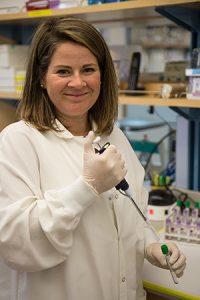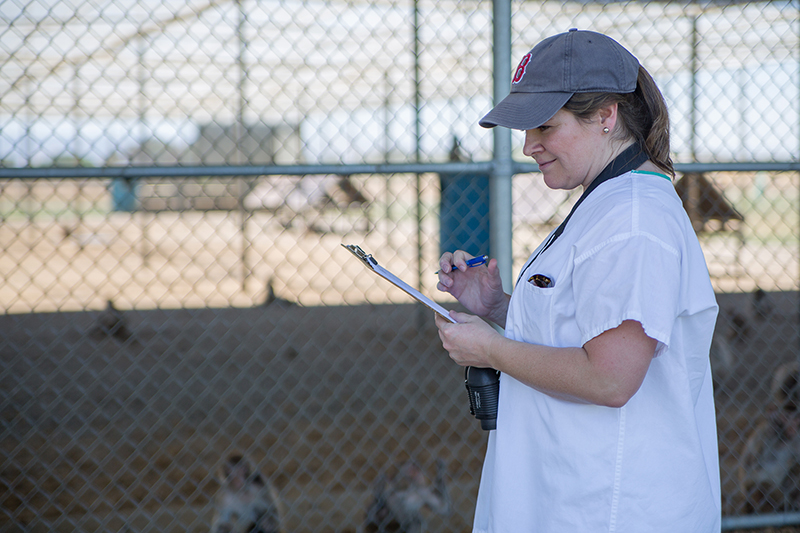Researcher Spotlight – Erin Kinnally, Assistant Research Psychologist

Photo Credit Kathy West
Do you ever wonder why the personality traits of some people in your family are so similar, while others are so different? How can this be if we share the same DNA? Assistant research psychologist Erin Kinnally, Ph.D., has dedicated her career to answering this question. Born and raised as part of a large, Irish Catholic family in Quincy, Massachusetts, Erin was intrigued at an early age by how inheritance and environment guided what traits we develop. What she has learned is that while DNA provides a genetic blueprint, there are other factors (some within our control) that dictate how active certain genes are, ultimately contributing to the differences that we see.
Intrigued by the work of Avshalom Caspi and Terrie Moffitt of Duke University demonstrating that DNA alone is not the definitive map to who we will become, she began to focus her work on how early-life environment changes how our brains and bodies develop.
“The more I learned, the more fascinated I became with how genes and our environment work in concert with each other to construct our personal traits,” says Kinnally. “Two decades ago we thought that mapping the genetic sequence would unlock all of the mysteries of who we are, but it turns out that the structure of our genes doesn’t tell us everything about our health, and certainly doesn’t tell us everything about why our minds work the way they do.”
Kinnally currently works at the California National Primate Research Center studying how early-life experiences shape how we respond to stress and influence our risk for particular disorders later in life. She studies rhesus monkeys because of the degree of genetic and neural similarity with humans. By observing their maternal-infant interactions and tracking the neurobehavioral development that results, she can provide insight into which events trigger certain responses. Recently, she and a team of scientists found that maternal aggression lowers expression of the serotonin transporter gene in infant monkeys. In humans, lower serotonin transporter is associated with depression and impulsive behavior.

Photo Credit Kathy West
“Studies like this suggest that having a particular DNA sequence does not guarantee that that a particular gene will work a certain way’” Kinnally says. “DNA acts as a blueprint for everything that will develop in our bodies, but what people may not know is that the expression, or activity, of our genes depends on so many dynamic factors, including experiences that happen early in our lives.”
Whether or not a gene is expressed (turned on) depends on many other factors in your life, and not necessarily just the structure of your DNA. Further, it appears that gene expression is not binary (simply on or off), meaning that it can be activated at different levels.
More recent work in rhesus monkeys by Kinnally has demonstrated that the effects of early experiences on certain traits are not limited to the exposed generation, but can also impact their offspring. In other words, your early-life experiences may also influence your children, and not just through your interactions with them. Kinnally and UC Davis research psychologist John Capitanio, Ph.D., found that male monkeys that had experienced a kind of early-life stress produced infants that tended to have higher levels of cortisol and greater anxiety-related behavior, compared with infants that had fathers reared in low-stress conditions. Interestingly, this effect was observed in animals that were apart from their parents after the first week of life. This suggests that the effects of early stress were somehow “transmitted” to offspring from fathers without social contact. Kinnally plans to dedicate part of her research program to understanding how this type of transgenerational effect of stress may occur.
As a mother of a 10-month old boy, Kinnally tries her best to leave her research at work and not overthink parenting. When asked how her work has influenced her approach to parenting, she responded, “My ancestors got me here by their genes and environment and the interaction between them. Whatever instincts that I have developed for raising my own child came from them, and I think I should just run with that.”

